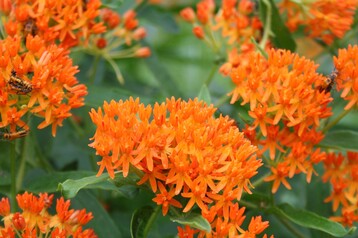Current Nature: Nurturing Native Plants
Maitland Bailey, Education Intern at the Linda Loring Nature Foundation •

Summer on Nantucket is one of the most gorgeous times of year. With sprawling ocean views and wonderful foliage, you can spend hours outside admiring the island’s natural beauty. This is also the time of year to see all the hard work that has gone into the spectacular gardens and landscaping around the island. As you take inspiration from the spaces around you, it is important to keep in mind not only the types of plants but if they are native species to Nantucket!
Native species are those that can naturally be found in a specific region or area, in this case the island of Nantucket. This means they are adapted to survive in the weather and soil conditions of the habitats here, ranging from forests to grasslands to marshes and dunes. In contrast, non-native species are those that have been introduced by humans to an area where they are not historically found. Many of these species were planted in new places for ornamental use, or carried to a new place accidentally as humans move around the world. Unfortunately, some non-native species turn into invasive species when introduced to their new environments. Invasive species grow quickly and can overwhelm and crowd out native species. Invasive plants often provide little to no food or habitat value to our birds and insects, so it is important to retain our native plants that support Nantucket’s wildlife.

When planning what blooms you’d like in your yard and garden, make sure to keep native species in mind. There are many great options for all types of plants, including flowering perennials like milkweeds and asters, or trees such as pitch pines and black cherries. Besides these, shrubs like huckleberries and blueberries offer delicate, beautiful flowers and a tasty snack in the hot summer. Planting native species also offers you the advantage of easier maintenance as they are adapted to live here. This means saving your time and money as there is less watering, fertilizer, and pesticide use required for native plants. Additionally, you will benefit Nantucket’s unique wildlife- native plants will attract butterflies and birds to your yard!
There are many places to find native plants for your space. Staff at garden centers and nurseries on Nantucket are a great resource, as they have experience in caring for and choosing suitable plants for different conditions. You can also collect seeds, given that you have permission from landowners to forage on their property.

During your spring garden cleaning, properly removing invasives is crucial to make sure they don’t spread. The most effective way to remove most invasives is to pull them or dig them out by the roots, ensuring there is nothing left behind to regrow from. It is best to pull the invasive plants early, before they get the chance to seed and further spread. After removing these, you can bag them and bring them to the Invasive Species dumpster at the Nantucket landfill. Some common invasive species found on Nantucket are Garlic Mustard, Spotted Knapweed, Japanese Knotweed and Black Swallow-wort.
If you are interested in learning more about native species, invasive species, and biodiversity, there are great resources that can be found on the Nantucket Biodiversity Initiative (NBI) website. This group is a coalition of conservation groups on the island that protect Nantucket’s special ecosystems. NBI hosts an Invasive Plant Species Committee, comprised of members who are knowledgeable about invasives and how to manage them. This committee has produced a guide suggesting native plant species for different growing conditions, and gets together weekly to tackle invasive plants across the island. Check out their website or get in touch if you have any questions or concerns about invasive species on Nantucket!
Stay tuned for more editions of Current Nature, a biweekly column from the Linda Loring Nature Foundation featuring seasonal topics, natural history information, and advice on the outdoors!